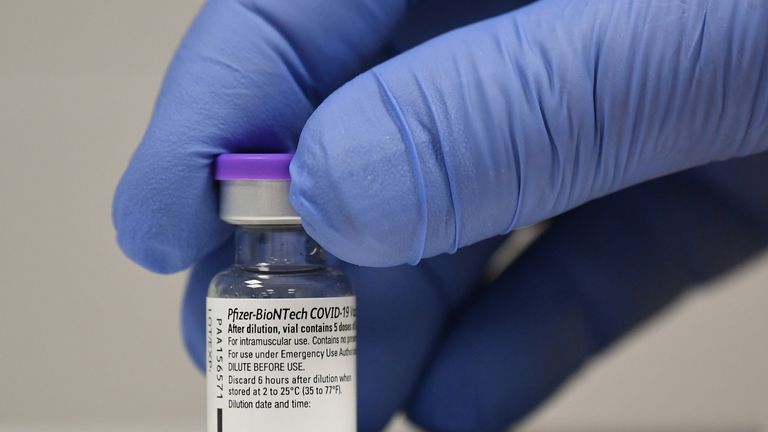COVID-19: No shortages of coronavirus vaccine in UK, says Pfizer
Deliveries of the Pfizer COVID-19 jab are on track and "progressing according to our schedule", the company says.
Saturday 2 January 2021 16:37, UK
Pfizer has said there are no shortages of its COVID-19 vaccine in the UK, despite a warning from England's chief medical officer.
A spokesperson for the pharmaceutical company said: "The deliveries are on track and progressing according to our agreed schedule."
Pfizer said 21 shipments of the vaccine have been delivered to the UK since it was approved by the medicines regulator in December.
The reassurance from the company comes after a report that two million doses of the Oxford-AstraZeneca vaccine, the second to be approved for use in the UK, will be supplied each week by the middle of January - with some 530,000 doses ready to be distributed from Monday.
The Times quoted what it described as a key member of the AstraZeneca team saying that one million doses will be ready next week. "The plan is then to build it up fairly rapidly - by the third week of January we should get to two million a week," the source reportedly said.
On Friday, another 53,285 positive tests were reported, although these figures did not include Northern Ireland or Wales. It brings the total for the past seven days to 319,912, up more than 30% compared with the previous week.
The number of people who have died within 28 days of a positive test rose by 613 to 74,125.
Hospitals across the country are also under severe strain, with just under half of England's major hospitals reporting more COVID-19 patients than during the peak of the first wave last year.
The UK has ordered 100 million doses of the Oxford vaccine but The Times reported that members of the team were frustrated at the pace of production, blaming the country's almost non-existent vaccine manufacturing capacity before the pandemic.
On Friday, Professor Chris Whitty said the UK needs to urgently maximise the number of people who are vaccinated, but a lack of global supplies will likely hamper efforts to protect the nation in the first part of 2021.
A letter signed by Professor Whitty and the chief medical officers for Scotland, Wales and Northern Ireland, said: "We have to ensure that we maximise the number of eligible people who receive the vaccine.
"Currently the main barrier to this is vaccine availability, a global issue, and this will remain the case for several months and, importantly, through the critical winter period.
"Vaccine shortage is a reality that cannot be wished away."
AstraZeneca has also reportedly said there is no problem with supply, with millions of doses already delivered.
Pfizer told The Daily Telegraph the number of doses it had sent to the UK was "in the millions" and AstraZeneca reportedly has 3.5 million doses in vials and another 15 million that can be bottled up and ready for use in a short period of time, although each batch must pass a 20-day sterility test and quality checks.
On Thursday, the UK's chief medical officers backed a change in guidance which says booster jabs should be given up to 12 weeks after an initial dose to maximise the number of people being vaccinated.
But the announcement on Wednesday prompted concern from Pfizer, with a spokesperson saying: "There are no data to demonstrate that protection after the first dose is sustained after 21 days."






